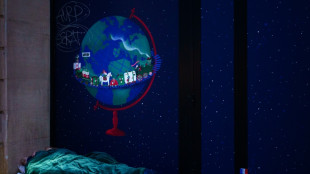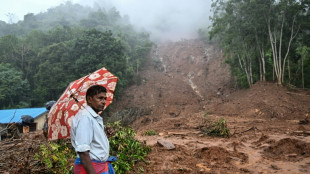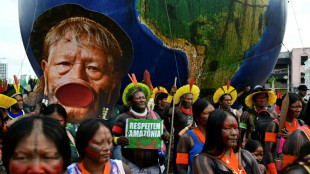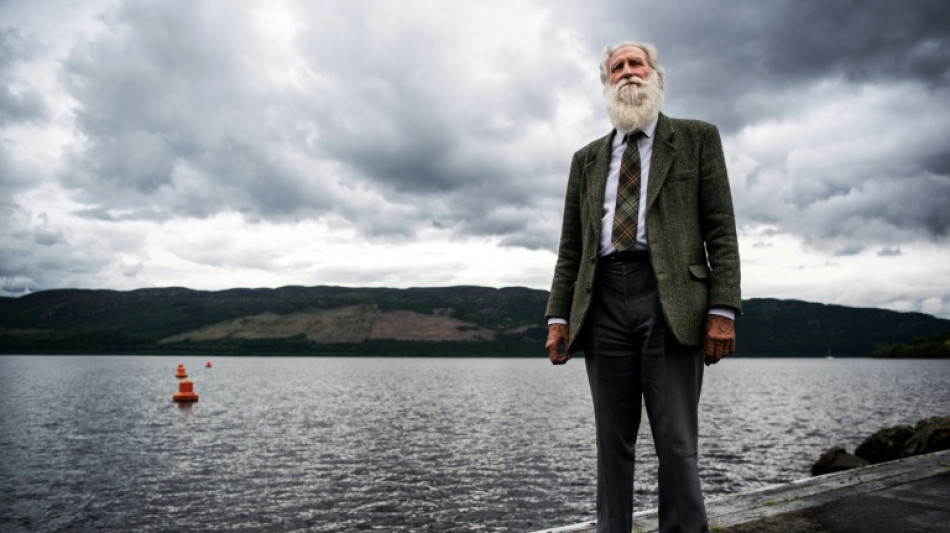
-
 Swiatek says women's tennis does not need 'Battle of the Sexes'
Swiatek says women's tennis does not need 'Battle of the Sexes'
-
Fritz struggling with 'serious tendonitis' ahead of Australian Open

-
 Sprawling CES gadgetfest a world stage for AI and its hype
Sprawling CES gadgetfest a world stage for AI and its hype
-
Zverev admits 'a lot of catching up' to reel in Alcaraz, Sinner

-
 Smith bats away retirement talk as he keeps England guessing
Smith bats away retirement talk as he keeps England guessing
-
NFL MVP Allen 'good to go' to extend streak in stadium farewell

-
 Grok under fire after complaints it undressed minors in photos
Grok under fire after complaints it undressed minors in photos
-
UN chief calls on Israel to reverse NGOs ban in Gaza

-
 Steelers' Watt 'excited' to return after lung injury
Steelers' Watt 'excited' to return after lung injury
-
Lens move four points clear of PSG at top of Ligue 1

-
 Tesla loses EV crown to China's BYD in 2025 as sales slip
Tesla loses EV crown to China's BYD in 2025 as sales slip
-
Sparklers blamed for deadly Swiss bar fire

-
 Frank confident he can win over disgruntled Spurs fans
Frank confident he can win over disgruntled Spurs fans
-
Yemen separatists launch two-year independence transition as strikes kill 20
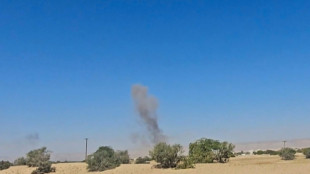
-
 6.5-magnitude quake shakes Mexico City and beach resort
6.5-magnitude quake shakes Mexico City and beach resort
-
Tech campaigner decries US 'punishment' after visa sanctions

-
 Swiss send dozens injured in bar fire abroad for treatment
Swiss send dozens injured in bar fire abroad for treatment
-
Stokes urges England to stick with McCullum despite Ashes defeat

-
 Yemen separatists announce two-year independence transition in shock move
Yemen separatists announce two-year independence transition in shock move
-
USA Olympic squad of NHL stars heavy on Four Nations talent

-
 Milei eases tax evasion rules to draw out 'mattress dollars'
Milei eases tax evasion rules to draw out 'mattress dollars'
-
France hooker Mauvaka returns after eight-month layoff

-
 Nigeria police charge fatal Joshua crash driver with dangerous driving
Nigeria police charge fatal Joshua crash driver with dangerous driving
-
Russia scores highest Ukraine gains since first year of war
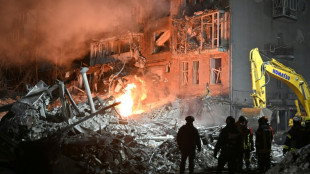
-
 Guardiola reaffirms City contract as Maresca speculation builds
Guardiola reaffirms City contract as Maresca speculation builds
-
Iran's protests: What we know

-
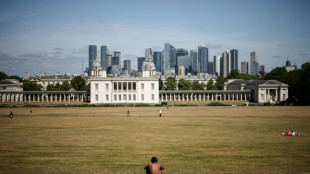 2025 was UK's hottest and sunniest year on record
2025 was UK's hottest and sunniest year on record
-
Strasbourg's Rosenior coy on Chelsea speculation

-
 Swiss bar blaze suspicions fall on sparklers waved by staff
Swiss bar blaze suspicions fall on sparklers waved by staff
-
US woman killed in rare suspected mountain lion attack

-
 Slot admits Liverpool's season has been 'constant battle'
Slot admits Liverpool's season has been 'constant battle'
-
Spurs forward Johnson completes Palace switch

-
 Endrick absent from Lyon year opener but 'adapting well': coach
Endrick absent from Lyon year opener but 'adapting well': coach
-
Ukraine says 19 wounded in Russian strike on Kharkiv housing area

-
 6.5-magnitude quake shakes Mexico City
6.5-magnitude quake shakes Mexico City
-
Tesla sales slip as it loses EV crown to China's BYD in 2025

-
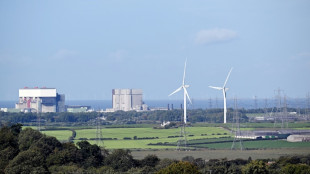 UK sees record-high electricity from renewables in 2025: study
UK sees record-high electricity from renewables in 2025: study
-
Budanov: Enigmatic spy chief set to become Zelensky's top aide

-
 Greece and Argentina make winning starts at United Cup
Greece and Argentina make winning starts at United Cup
-
Nortje gets nod for South Africa's T20 World Cup campaign

-
 Arteta urges Arsenal to break New Year Premier League curse
Arteta urges Arsenal to break New Year Premier League curse
-
Norway closes in on objective of 100% electric car sales

-
 Dani Alves invests in Portuguese third division club
Dani Alves invests in Portuguese third division club
-
Trump says US will 'come to their rescue' if Iran kills protesters
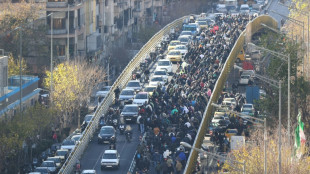
-
 Orsted files lawsuit against US suspension of wind turbine leases
Orsted files lawsuit against US suspension of wind turbine leases
-
South Koreans now free to read North's newspaper, once banned as seditious

-
 Stocks make bright start to 2026
Stocks make bright start to 2026
-
Bashir, Potts in England squad for final Ashes Test

-
 Argentina topple Spain for winning United Cup start
Argentina topple Spain for winning United Cup start
-
Champions Narvaez and Ruegg to defend Tour Down Under titles


Loch Ness struggles with Scotland's shifting climate
Around Scotland's Loch Ness, famous for hosting a mythical monster in its murky depths, another prolonged dry spell earlier this year has heightened fears of a different kind.
The drier than usual start to 2023, alongside other gradual climate shifts, is having implications for everything from native wildlife and species -- including Scotland's famous salmon population -- to farming and power production.
"Water is becoming a commodity that's becoming scarce in this part of the world," salmon fisherman Brian Shaw told AFP during a visit early last month, as Scotland reeled from its hottest June on record.
"Everybody's looking to use the water for their own needs."
Figures released in May by the Scottish Environment Protection Agency (Sepa) confirmed what seasoned observers could already see: Loch Ness's fresh waters -- Scotland's largest by volume -- had dropped to their lowest level in decades.
It had not been this shallow -- with a depth of around 109 cms (3.5 ft) at a hydroelectric dam halfway along its eastern shore -- since the early 1990s.
"It's held at this level for several months now," Gordon Mangus, 84, who grew up near the legendary lake and now serves as its harbour master, noted.
"We are used to rain, but we are not used to having quite such dry spells."
The situation is mirrored in other Highlands areas, including Loch Maree to the northeast and Black Isle to the west.
- More dry weather -
"Everybody thinks of Scotland as a wet country, but the droughts are becoming more frequent now, as a result of climate change," explained Nathan Critchlow, the head of water and planning at Sepa.
"We used to see drought very rarely, about once every 18 years. By 2050, we predict you will have very low water levels about every other year.
"So Scotland's climate is changing and we are starting to see the impacts of that change."
On the banks of the River Ness, which flows from the loch into the sea at Inverness, the UK's northernmost city, Shaw pointed to the waterway's visible stone bed as evidence of its diminishing levels.
The director of the Ness District Salmon Fishery Board said the river's depth had been falling steadily for years, but the trend had become more noticeable.
"A dry winter, a really dry spring, a very hot June and the river just got smaller and smaller," he told AFP.
The warmer, drier weather had hit its wild salmon population, Shaw said.
One of the small streams that feeds the river has already dried up, leaving dead fish behind, he added.
"You're starting to see this sort of event happening all the time and I think there's real concern about the future of salmon and a more challenging environment as we go ahead."
While much-needed rain in recent weeks has brought some respite to parts of Scotland, water levels remain depleted to "an alert point" in some areas, according to Sepa.
And Britain's Meteorological Office is forecasting another dry period later in the summer.
- Demand for water -
Demand for water in summer is also intensifying, with more competition for it among farmers, fishermen, domestic users including tourists and hydroelectric firms, according to locals.
SSE Renewables, which runs a hydroelectric scheme at Loch Ness, has faced claims from fishermen and others that it was causing the loch's levels to drop by storing water to generate electricity.
The operator has denied that, saying the months of dry weather had depleted it.
Environmental experts are warning residents and businesses must adapt to the changing weather patterns and to prepare for periods of water scarcity and floods as the average temperature rises.
According to the Climate Change Committee (CCC), an advisory body appointed by the UK Government, Scotland's 10 warmest years on record have all occurred since 1997.
The average temperature between 2010 and 2019 was around 0.7 degrees Celsius warmer than the average between 1961 and 1990.
Wetter weather in some places has arrived in tandem with the temperature rises, mainly in winter, with the annual average rainfall between 2010 and 2019 up nine percent on 1961-1990.
At Loch Ness, before retreating back to his cabin to monitor the boats, Mangus recalled childhood memories, from entering its waters to exploring its shoreline with his father and brother.
Although the octogenarian blames the hydroelectric dam as much as the changing climate for Loch Ness's shifting water levels, he conceded that what is happening there now is "rare".
J.Williams--AMWN
